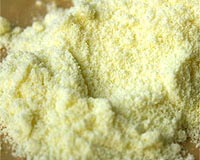 |
Moscow (AFP) Aug 15, 2010 A ban on Russian grain exports ordered by Prime Minister Vladimir Putin came into force on Sunday, with the government battling to keep down prices of basic foodstuffs amid a record drought. According to a government decree signed by Putin on August 5, the ban will extend from August 15 up until December 31, although the powerful premier has indicated it may even extend beyond that date if the harvest is bad. Russia, the world's number three wheat exporter last year, has already warned that its grain harvest this year will be just 60-65 million tonnes, compared to 97 million tonnes in 2009. The drought amid the worst ever heatwave in Russia's history has ruined one quarter of the country's crops, according to President Dmitry Medvedev. The export ban is aimed at keeping the Russian domestic market well supplied with grain to prevent sharp rises in prices. The export ban includes wheat; a mixture of wheat and rye known as meslin; barley; rye; corn and wheat flour, according to the August 5 government decree. Russia's leaders, acutely nervous of social unrest, will be keen to avoid any discontent over food prices. "We must not allow an increase in domestic prices and must preserve the headcount of our cattle," Putin said bluntly as he announced the ban. Last year, Russia exported 21.4 million tonnes of grain and had even embarked on a major new campaign to boost its international market share, an ambition that now must be set aside for some time. Russia requires 78 million tonnes of grain domestically and can cover the shortfall with 9.5 million tonnes from a state fund and 21 million tonnes left over from last year's harvest, the government has said. Medvedev acknowledged last week that both market participants and ordinary people were worried about "how this extraordinarily hard summer would affect the prices of the most basic foodstuffs". He vowed the authorities would not allow grain prices to rise and would keep a close eye on costs for food products such as flour, bread, meat and milk. The export ban from such a key global player stung world wheat markets, sending prices to two-year highs and sparking worries of a crisis in global food supplies. Putin has shrugged off the controversy, warning that the ban could even be extended. "There is no need to count on a quick removal of the export ban," he said, adding that anyone waiting for December 31 was doing so "in vain". There has been criticism of the ban even within Russia, with some players saying it will take the country years to regain its international market position and risks driving domestic grain producers out of business. In contrast to the tough talk of the prime minister, Medvedev admitted that producers had been put in a difficult position. He said they should be helped so they can prove they had no option but to comply with the ban when they failed to meet contracts. "We have put producers involved in exports into a difficult position," he said. "Having done this, we must help them have the legal proof that (there) was a force majeure and it was not possible to fulfil deliveries." The drought has been devastating news for thousands of farmers across Russia who may need years to recover from the crisis, analysts say. "Even if the weather returns to seasonal norms quickly, repercussions will certainly be felt into 2011 as the heat wave and drought have made winter sowing problematic or impossible," Renaissance Capital said.
Share This Article With Planet Earth
Related Links Farming Today - Suppliers and Technology
 China says no evidence milk powder caused infant breasts
China says no evidence milk powder caused infant breastsBeijing (AFP) Aug 15, 2010 China's health ministry said Sunday an investigation had found no evidence that milk powder produced by a Chinese company caused three infant girls to grow breasts. The clinical investigation found the hormone levels in the baby formula were within the normal range, health ministry spokesman Deng Haihua told a news conference in Beijing, according to a transcript on the ministry's website. ... read more |
|
| The content herein, unless otherwise known to be public domain, are Copyright 1995-2010 - SpaceDaily. AFP and UPI Wire Stories are copyright Agence France-Presse and United Press International. ESA Portal Reports are copyright European Space Agency. All NASA sourced material is public domain. Additional copyrights may apply in whole or part to other bona fide parties. Advertising does not imply endorsement,agreement or approval of any opinions, statements or information provided by SpaceDaily on any Web page published or hosted by SpaceDaily. Privacy Statement |